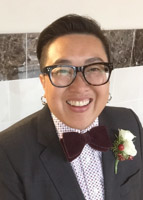Alice Y. Hom
Themes — Activism, Childhood, Coming Out, Community, East Asian Experience, Familial Relationships, Generational Differences / Gaps, Race, Self-Identification

Alice Y. Hom is a queer Asian American writer and community activist. She grew up the youngest of five children in the Highland Park suburb of Los Angeles. Her parents spoke little English and her oldest sister often took on a parental role through attending parent-teacher conferences and running errands. As an undergraduate at Yale in 1985, Alice discovered an affinity to Asian American studies after dropping out of a Mandarin language class and finding the more relatable ethnic studies classes instead. Recognizing the lack of conversation relating to gender and sexuality in the field, she was inspired to explore the topic herself and resolved to write about Asian American feminism. Later, as a Master’s student at UCLA in the early 90’s, she was encouraged by her English professor to write about Asian American lesbians, and her thesis on the Asian Pacific Lesbian Network connected her to a network of women across the country.
After UCLA, Alice was the founding director of the Intercultural Community Center at Occidental College from 2001 to 2006. In 2007, Alice started working at Asian Americans/Pacific Islanders in Philanthropy (AAPIP) to focus on a gender and equity campaign. After learning about the meager percentage of annual philanthropic dollars that go to Asian American queer causes, she started the Queer Justice Fund in 2009 to educate advocacy within API communities and foster support. Alice’s first authorship came as an editor and contributor to Q&A: Queer in Asian America. The book won several awards and serves as a pioneering work and resource for Asian American queer studies. She has also contributed to the AAPI Nexus Journal, Journal of Asian American Studies, and Lesbian Histories and Cultures: An Encyclopedia as well as finishing her PhD dissertation, Unifying Differences: Lesbian of Color Community Building in Los Angeles & New York, 1970s-1980s, in 2011. Today, Alice serves as board members for Borealis Philanthropy and Cal Humanities.
“What we need to do is just…you’re loved and you’re valued and you belong. And you don’t have to belong because you dress the right way or because you have a lot of money or you have good friends or because your parents do this. You should just be valued because you are. By just being.”
